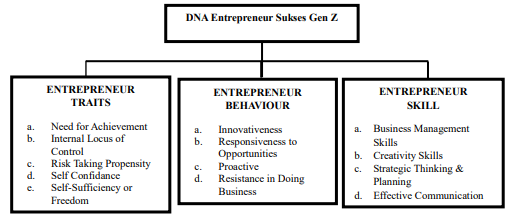
Submission to VIJ 2024-08-11
Keywords
- Entrepreneurship, Gen Z, Entrepreneur Traits, Entrepreneurial Personality Model
Copyright (c) 2024 Ni Luh Komang Megayanti, Luh Putu Mahyuni

This work is licensed under a Creative Commons Attribution 4.0 International License.
Abstract
The journey and success of a company are profoundly shaped by the entrepreneur's personality. Qualitative research with a phenomenological approach was used to identify the personality model of successful Gen Z entrepreneurs in developing countries such as Indonesia. Through in-depth interviews with 6 business owners, it was revealed that all informants had personalities related to entrepreneurial traits, entrepreneurial behavior, and entrepreneurial skills. This combination enables them to compete and innovate in a dynamic market and drive sustainable economic growth. According to the research, Gen Z entrepreneurs thrive in collaborative environments, are creative and community-focused, flexible, aware of their target market, and attentive to the needs and preferences of their customer. These findings contribute to designing programs and policies that support entrepreneurship development among the younger generation to encourage innovation, collaboration, and sustainable economic growth.
References
- Ajheng Mulamukti A. Pratiwi, Alvin Eryandra, Puti Archianti, Angga, B., & Ardiansah. (2022). Risk Taking, Innovatives, Locus of Control, Need for Achievement, Self Efficacy. Jurnal Ilmiah Indonesia, 7(8).
- Anggarini, D. T. (2022). Generation Z and Millenial Perspectives to Become Entrepreneurs in the Era of Gig Economy. Jurnal Ekonomi Dan Manajemen, 16(1), 10–26.
- Antoncic, B., & Marks, L. J. (2016). Risk-Taking Propensity and Entrepreneurship: The Role of Power Distance in Six Countries.
- Arnianti. (2021). Teori Perkembangan Psikoanalisis. Jurnal Penelitian Guru Indonesia, 1(September 2021), 1–13.
- Astuti, R. P., Bahtera, N. I., & Atmaja, E. J. J. (2019). Entrepreneurial Characteristics and Behaviors of Muntok White Pepper Farmers. Society, 7(2), 101–115. https://doi.org/10.33019/society.v7i2.116
- Auer Antoncic, J., & Antoncic, B. (2018). Need for Achievement of the Entrepreneur, Intrapreneurship, and the Growth of Companies in Tourism and Trade. 3rd International Thematic Monograph - Thematic Proceedings: Modern Management Tools and Economy of Tourism Sector in Present Era, 259–265. https://doi.org/10.31410/tmt.2018.259
- Badan Pusat Statistik. (2010). Gen Z Dominan, Apa Maknanya bagi Pendidikan Kita? https://pskp.kemdikbud.go.id/produk/artikel/detail/3133/gen-z-dominan-apa-maknanya-bagi-pendidikan-kita
- Cagarman, K., & Stiftung, B. (2023). Gen Z Pioneering Entrepreneurs : Entrepreneurs : Reflections and and Policy Policy Reflections Considerations Considerations. November, 1–28. https://doi.org/10.11586/2023090
- Datta, P., Peck, J. A., Koparan, I., & Nieuwenhuizen, C. (2020). Entrepreneurial continuance logic: The interplay between climate, commitment, and entrepreneurial responsiveness. Management Decision, 58(7), 1247–1282. https://doi.org/10.1108/MD-05-2017-0537
- Diawati, P., Ausat, A. M. A., & Augustin Jeneva. (2023). Creativity: How to Develop an Entrepreneurial Attitude of Creativity. Journal on Education, 05(03), 11116–11122. http://jonedu.org/index.php/joe
- Fajariah, M., & Suryo, D. (2020). Sejarah Revolusi Industri di Inggris Pada Tahun 1760-1830. HISTORIA: Jurnal Program Studi Pendidikan Sejarah, 8(1), 77. https://doi.org/10.24127/hj.v8i1.2214
- Grivokostopoulou, F., Kovas, K., & Perikos, I. (2019). Examining the Impact of a Gamified Entrepreneurship Edu Framework in HE.pdf.
- Hamzah, M. I., & Othman, A. K. (2023). How do locus of control influence business and personal success? The mediating effects of entrepreneurial competency. Frontiers in Psychology, 13(January), 1–15. https://doi.org/10.3389/fpsyg.2022.958911
- Hartati Arfin, I. (2020). Strategi Pembangunan Sdm Kementerian Keuangan Republik Indonesia Dalam Menghadapi Tantangan Era Disrupsi 4.0. Jurnal BPPK : Badan Pendidikan Dan Pelatihan Keuangan, 13(1), 109–129. https://doi.org/10.48108/jurnalbppk.v13i1.493
- Hastuti, Ganafri, Asmar Yulastri, Ambiar, Doni Tri Putra Yanto, & Andrian. (2023). Profil Entrepreneur Era Digital dalam Menghadapi Society 5.0. JTEV (Jurnal Teknik Elektro Dan Vokasional), 9(1), 139–140. https://doi.org/10.24036/jtev.v9i1.121838
- Komara, E., & Adiraharja, M. I. (2020). Integrasi Nilai-nilai Kearifan Lokal dalam Pembelajaran Kewirausahaan di SMK Negeri 10 Kota Bandung. Mimbar Pendidikan, 5(2), 117–130. https://doi.org/10.17509/mimbardik.v5i2.28870
- Meliani, D., & Panduwinata, L. F. (2022). Pengaruh Mata Kuliah Kewirausahaan dan Motivasi Berwirausaha terhadap Pembentukan Jiwa Green Entrepreneur Mahasiswa. Jurnal Pendidikan Administrasi Perkantoran (JPAP), 10(1), 16–30. https://doi.org/10.26740/jpap.v10n1.p16-30
- Moerdijat, L. (2023). Butuh Konsistensi Cetak Wirausaha Muda untuk Wujudkan Indonesia sebagai Negara Maju. https://www.mpr.go.id/berita/Butuh-Konsistensi-Cetak-Wirausaha-Muda-untuk-Wujudkan-Indonesia-sebagai-Negara-Maju
- Prastiwi, N. L. P. E. Y., Hartawan, I. G. M. D., Kasih, N. L. S., Agustin, A. A. A. M. T., & Sari, P. R. K. (2023). the Implementation of Womenpreneur Mindset and Proactive Personality in the Efforts To Improve Msme Performance. International Journal of Application on Economics and Business, 1(4), 2416–2427. https://doi.org/10.24912/ijaeb.v1i4.2416-2427
- Rahayu, K. D., Indriyani, A. R. A., Harnaji, B., & Sinurat, F. (2023). Generation Z: Entrepreneurs and Expectations in the Workplace (Case Studies in Some Provinces in Indonesia) (Issue 2019). Atlantis Press International BV. https://doi.org/10.2991/978-94-6463-154-8_19
- Rahimallah, M. T. A. R. (2022). Perubahan Prilaku Komunikasi Dan Budaya Sosial Akibat Disrupsi Teknologi Dan Informasi (Seri Review Buku). Osf Preprints, 1–18. File:///C:/Users/Asus/Downloads/Perubahan Prilaku Komunikasi Dan Budaya Sosial Akibat Disrupsi Teknologi Dan Informasi (1).pdf
- Rahmasari, S. (2023). Strategi Adaptasi Bisnis di Era Digital: Menavigasi Perubahan dan Meningkatkan Keberhasilan Organisasi. Karimah Tauhid, 2(3), 622–636.
- Rosyadi, S. (2018). Revolusi industri 4.0 : Peluang dan Tantangan Bagi Alumni Universitas Terbuka. Fakultas Ilmu Sosial Dan Ilmu Politik, 2, 1–10.
- Saiyed, M., Gupta, B., & Srivastava, N. (2022). Entrepreneurship and Ethics -Perspective of Gen Z. International Journal of Special Education, 37(June), 5274. https://doi.org/10.5281/zenodo.6140996
- Saura, J. R., Palacios-Marqués, D., Correia, M. B., & Barbosa, B. (2023). Innovative behavior in entrepreneurship: Analyzing new perspectives and challenges. Frontiers in Psychology, 14. https://doi.org/10.3389/fpsyg.2023.1123236
- Singgih, J. A. Y. A. (2020). Peran pengusaha muda dalam mendorong perekonomian Indonesia guna meningkatkan pembangunan nasional. Jurnal Kajian Lembaga Ketahanan Nasional Republik Indonesia, 8(3), 337–348.
- Sukeni, K., Anynussyawiby, & Gonita, A. (2023). Peran Generasi Z Dalam Mendukung Sustainable Development Goals Melalui Pengembangan Ekonomi Hijau Menuju Indonesia Emas 2045. E-Journal.Unmas.Ac.Id, 156–163. https://e-journal.unmas.ac.id/index.php/pilar/article/download/6124/4657
- Sutikno, A. N. (2020). Bonus demografi di indonesia. Visioner, 12(2), 421–438. file:///C:/Users/ASUS/Downloads/285-Article Text-744-1-10-20201019.pdf
- Syawal, S. H. (2018). Psikoanalisis Sigmund Freud dan Implikasinya dalam Pendidikan Helaluddin Syahrul Syawal. Academia.Edu, March, 5–6. http://www.academia.edu/download/60642918/Psikoanalisissigmudfreud20190919-88681-dfxtxf.pdf
- Wardhana, A. (2024). Membangun Model Kewirausahaan Berkelanjutan (Issue July).
- Yordan Rendis Suherman, Tangkas Ageng Nugroho, Fitra Barokah Quraini, & Muhammad Yasin. (2023). Analisis Perkembangan Industrialisasi Era 5.0 Terhadap Kondisi Pendidikan Di Kecamatan Menganti Kabupaten Gresik Jawa Timur. Jurnal Kajian Dan Penelitian Umum, 1(3), 169–182. https://doi.org/10.47861/jkpu-nalanda.v1i3.241